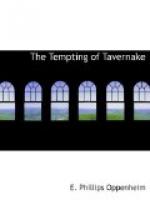“I have taken to a pipe,” he admitted.
“Then light it and listen,” she went on, smoothing her hair for a minute in front of the looking-glass. “You want to know about Elizabeth, of course.”
“Yes,” he said, “I want to know.”
“Elizabeth, on the whole,” Beatrice continued, “got out of all her troubles very well. Her husband’s people were wild with her, but Elizabeth was very clever. They were never able to prove that she had exercised more than proper control over poor Wenham. He died two months after they took him to the asylum. They offered Elizabeth a lump sum to waive all claims to his estate, and she accepted it. I think that she is now somewhere on the Continent.”
“And you?” he asked. “Why did you leave the theatre?”
“It was a matter of looking after my father,” she explained. “You see, while he was there with Elizabeth he had too much money and nothing to do. The consequence was that he was always —well, I suppose I had better say it—drinking too much, and he was losing all his desire for work. I made him promise that if I could get some engagements he would come away with me, so I went to an agent and we have been touring like this for quite a long time.”
“But what a life for you!” Tavernake exclaimed. “Couldn’t you have stayed on at the theatre and found him something in London?”
She shook her head.
“In London,” she said, “he would never have got out of his old habits. And then,” she went on, hesitatingly, “you understand that the public want something else besides the hypnotism—”
Tavernake interrupted her ruthlessly.
“Of course I understand,” he declared, “I was there to-night. I understood at once why you were not very anxious for me to go. The people cared nothing at all about your father’s performance. They simply waited for you. You would get the same money if you went round without him.”
She nodded, a trifle shamefacedly.
“I am so afraid some one will tell him,” she confessed. “They nearly always ask me to leave out his part of the performance. They have even offered me more money if I would come alone. But you see how it is. He believes in himself, he thinks he is very clever and he believes that the public like his show. It is the only thing which helps him to keep a little self-respect. He thinks that my singing is almost unnecessary.”
Tavernake looked into that faint glimmer of miserable fire. He was conscious of a curious feeling in his throat. How little he knew of life! The pathos of what she had told him, the thought of her bravely traveling the country and singing at third-rate music-halls, never taking any credit to herself, simply that her father might still believe himself a man of talent, appealed to him irresistibly. He suddenly held out his hand.
“Poor little Beatrice!” he exclaimed. “Dear little sister!”




